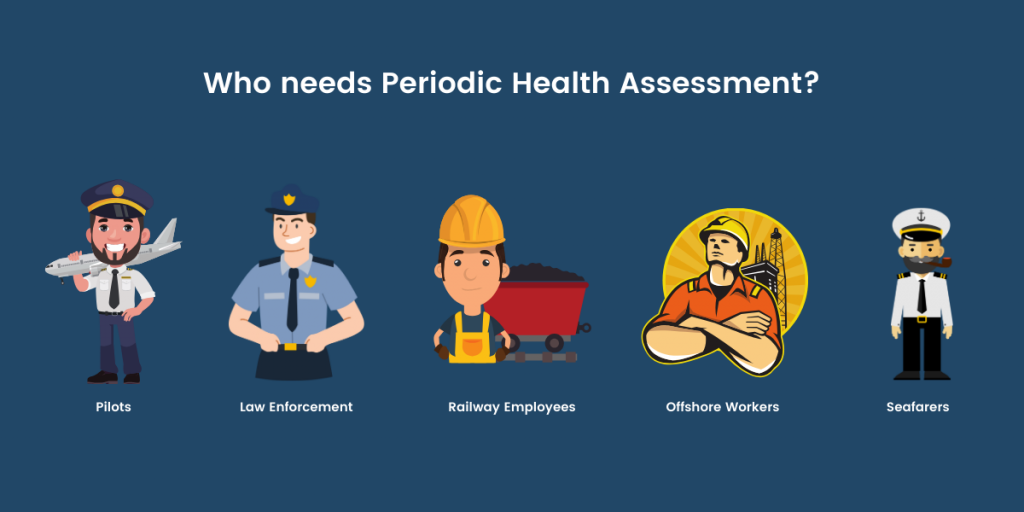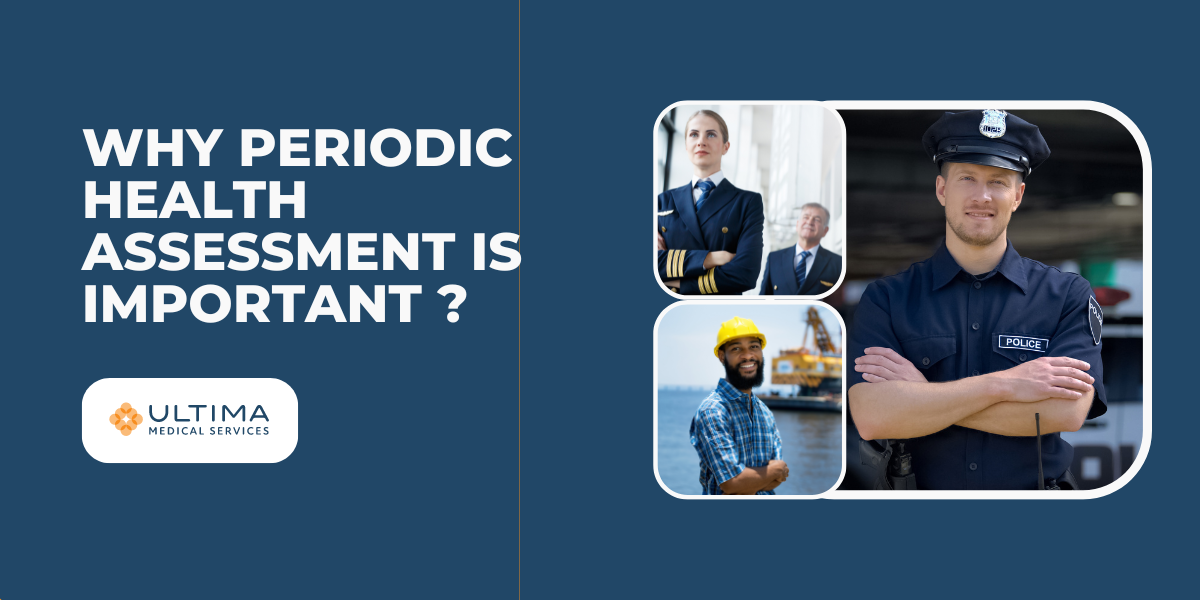Periodic Health Assessment (PHA) is a crucial aspect of maintaining overall well-being and ensuring proactive healthcare management. It involves regular medical examinations aimed at assessing an individual’s health status, identifying potential risks, and implementing preventive measures. In this blog, we’ll talk about the significance of Periodic Health Assessment, what it entails, who needs it, and where you can access it in British Columbia (BC).
What is Periodic Health Assessment?
Periodic Health Assessment (PHA), also referred to as routine medical check-ups or annual physicals. It is a comprehensive evaluation of an individual’s health status conducted at regular intervals. This assessment encompasses a range of components designed to assess various aspects of a person’s well-being. It provides insights into their overall health and helping to identify potential health issues early on.
During a Periodic Health Assessment (PHA), a comprehensive evaluation is conducted to assess an individual’s health status. This includes reviewing their medical history, medications, allergies, surgeries, and family medical history to identify any hereditary conditions. Performing a physical examination evaluates vital signs and overall physical condition. It includes conducting laboratory tests and screenings such as blood tests, urinalysis, and imaging tests to assess various health markers and screen for diseases like cancer or cardiovascular issues. Reviewing immunization status and recommending necessary vaccinations is also part of the process.
Health counseling covers lifestyle factors like diet, exercise, smoking cessation, and stress management, aiming to promote overall well-being. Mental health screening and occupational health assessments are also included. This addresses emotional well-being, workplace safety, and ergonomic considerations for specific occupations or industries.
Why Periodic Health Assessment is Important?
Early Detection of Health Issues
PHAs help in early detection of potential health problems such as high blood pressure, diabetes, cardiovascular diseases, and certain types of cancer. Early detection enables timely intervention and better management of these conditions, reducing the risk of complications.
Preventive Care
Regular check-ups allow healthcare providers to assess risk factors and provide preventive care strategies. This includes lifestyle modifications, vaccination service, screening tests, and counseling on nutrition and exercise, promoting long-term health and well-being.
Monitoring Health Trends
PHAs establish baseline health parameters and track changes over time. This helps in identifying emerging health trends, evaluating the effectiveness of treatment plans, and making necessary adjustments to optimize health outcomes.
Occupational Health
For individuals working in safety-sensitive roles or industries with potential health risks, PHAs are essential. These assessments ensure compliance with industry regulations, monitor workplace health, and prevent occupational hazards.
Holistic Approach to Health
PHAs encompass a holistic approach to health, addressing physical, mental, and emotional well-being. They provide an opportunity for individuals to discuss concerns, seek guidance on health goals, and receive comprehensive care from healthcare professionals.
What happens in Periodic Health Assessment?
During a PHA, individuals undergo a comprehensive series of evaluations and tests. This includes filling out a personal medical questionnaire to provide insights into their medical history. The review of family history and risk factors helps identify potential hereditary conditions or diseases that may influence their health.
A key component of the PHA is the physical examination. Healthcare providers assess vital signs such as blood pressure, heart rate, respiratory rate, and temperature. They also conduct a detailed assessment of the individual’s cardiovascular health. Listening to the heart and lungs, checking reflexes, and examining for any signs of abnormalities are part of the assessment. An audiogram evaluates hearing abilities to assess sensory health, while visual acuity testing assesses vision. An ECG/EKG (Electrocardiograph) is conducted to evaluate heart function and detect abnormalities for individuals at risk of heart-related issues. Spirometry measures airflow and lung capacity to assess lung function.
Additionally, body composition analysis and BMI calculations provide insights into overall body composition and weight management. Laboratory tests are a crucial part of the PHA. It include blood tests to assess cholesterol levels, blood sugar levels, kidney function, liver function, and other important health markers. Urinalysis may also be conducted to check kidney function and detect any urinary tract abnormalities. For individuals in occupations with potential respiratory hazards, a Respirator FIT test is conducted. The PHA also includes comprehensive discussions on lifestyle factors. Including diet, exercise, smoking cessation, alcohol consumption, stress management, sleep habits, and mental well-being. This allows healthcare providers to offer personalized guidance on health goals, preventive measures, and strategies for maintaining optimal health.

Who needs Periodic Health Assessment?
Periodic Health Assessments (PHAs) are valuable for a wide range of individuals, including:
Employees in Safety-Sensitive Roles
Pilots, air traffic controllers, law enforcement officers, railway workers, offshore personnel, seafarers, marine workers, miners, and others in safety-critical positions often require PHAs due to the nature of their work and regulatory requirements. These assessments ensure that individuals in safety-sensitive roles are physically and mentally fit to perform their duties safely and effectively.
Individuals with Specific Health Conditions
Those with chronic health conditions such as diabetes, hypertension, heart disease, asthma, or cancer may benefit from regular PHAs to monitor their health status, manage their conditions, and prevent complications. PHAs can help healthcare providers identify early signs of disease progression or medication side effects, leading to timely interventions and improved health outcomes.
Proactive Healthcare Management Seekers
Individuals who prioritize preventive healthcare and wellness may opt for PHAs to assess their overall health status, identify potential risk factors, and receive personalized health recommendations. PHAs empower individuals to take proactive steps towards maintaining their health, preventing future health problems, and achieving their wellness goals.
Occupational Health and Safety Compliance
Employers may mandate PHAs as part of occupational health and safety programs. This is to comply with industry regulations, mitigate workplace hazards, and promote a safe working environment.
PHAs help employers ensure that their workforce remains healthy, productive, and capable of performing job duties safely, reducing the risk of work-related injuries or illnesses.
Age-Specific Health Monitoring
As individuals age, regular PHAs become increasingly important for monitoring age-related health changes, assessing cognitive function, screening for age-related diseases (e.g., osteoporosis, dementia), and promoting healthy aging practices.
PHAs tailored to age-specific health needs can detect early signs of age-related conditions, enabling timely interventions and improving quality of life.
Overall, PHAs cater to a diverse population, offering personalized healthcare assessments, early disease detection, health risk management, and support for occupational health and safety initiatives.
Ultima Medical Provides the Best Periodic Health Assessment in BC
Ultima Medical stands out in offering the finest Periodic Health Assessments in BC, with a comprehensive approach that extends beyond physical evaluations. Alongside detailed medical exams, Ultima Medical prioritizes occupational health assessments, addressing workplace safety, and ergonomic concerns tailored to specific industries. Our assessments are particularly beneficial for professionals in safety-sensitive roles. Including aviation personnel, law enforcement personnel, railway employees, offshore workers, seafarers, marine workers, miners, and others whose work environments demand heightened attention to health and safety. With Ultima Medical, these individuals can undergo thorough health evaluations that ensure they meet the rigorous health standards required for their jobs, promoting a safer and healthier work environment overall. This holistic approach ensures not just physical fitness but also mental and occupational wellness for employees, making Ultima Medical a top choice for businesses seeking comprehensive periodic occupational health solutions in British Columbia.
Periodic Health Assessment plays a vital role in maintaining optimal health, preventing disease, and promoting overall well-being. By undergoing regular PHAs, individuals can take proactive steps towards a healthier lifestyle, early detection of health issues, and personalized healthcare management. Ultima Medical’s expertise in providing comprehensive periodic health assessment services makes it the ideal choice for those seeking top-notch occupational health services in British Columbia.


